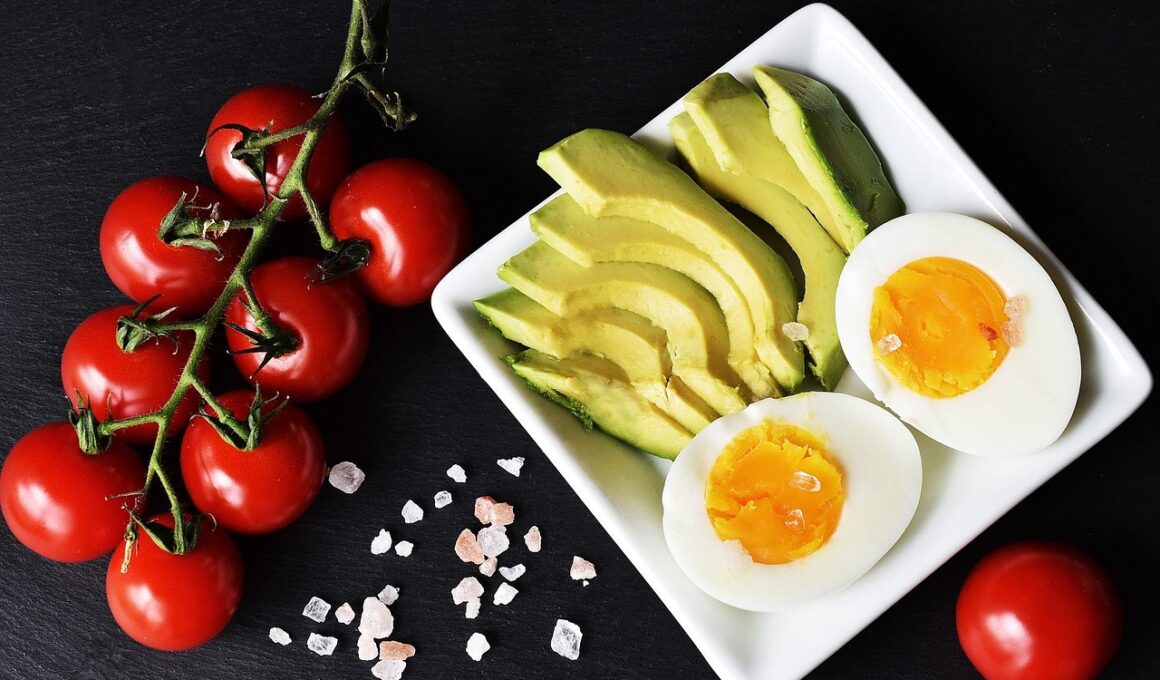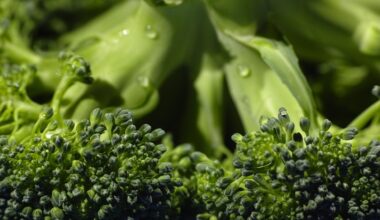Exploring Vegan Keto Diets for Fitness Enthusiasts
The vegan keto diet merges plant-based eating principles with strict low-carb guidelines. It attracts fitness enthusiasts aiming for weight loss and muscle preservation. Understanding the balance of macronutrients is vital for success on this diet. Typically, vegan keto emphasizes fats, moderate protein, and very low carbohydrates. Primary sources of fat include nuts, seeds, avocados, and oils. Protein options are limited to plant-based proteins such as seitan, tofu, and tempeh. These foods provide essential amino acids while staying within carbohydrate limits. However, achieving nutrient diversity is crucial. Including leafy greens and low-carb vegetables enhances fiber intake and vitamins. Fitness enthusiasts may find that this combination supports energy levels during workouts, improving overall performance. Vegan keto can also help reduce body fat, which is appealing for those focused on aesthetics and health. Careful planning is required to avoid nutrient deficiencies, particularly in B12, iron, and omega-3 fatty acids. Supplements can be considered if dietary intake is insufficient. Adopting this diet should involve seeking advice from a nutritionist or dietitian familiar with both vegan and ketogenic nutrition.
As fitness enthusiasts explore the vegan keto diet, they often grapple with meal ideas that adhere to these restrictions. Creating satisfying meals while ensuring the right macronutrient ratios can be challenging. Some popular options include chia seed pudding, avocado salads, and coconut-based smoothies. Chia seeds are an excellent source of omega-3 fatty acids, while avocados provide healthy fats and a creamy texture. A meal prep strategy that involves bulk cooking can help in maintaining adherence to the diet. Batch cooking low-carb vegetables and proteins and storing them in ready-to-eat containers is an efficient way to ensure compliance. Consider adding variety through different spices and herbs, which can greatly enhance the flavor of meals. It’s also essential to pay attention to portion control, as even healthy fats can add up quickly in calories. To maintain energy levels throughout the day, fitness enthusiasts should focus on balanced meals containing fiber and healthy fats. Experimenting with various recipes can help in finding the best combinations that satisfy hunger while sustaining energy. Engaging with online communities for vegan keto can provide support and share successful meal ideas and inspiration.
Nutritional Challenges in Vegan Keto
While following a vegan keto diet, one must be aware of the nutritional challenges it presents. Achieving the necessary nutrient intake can be difficult due to limited food choices. For example, essential nutrients like protein and healthy fats must be carefully sourced. Relying solely on processed meat substitutes may lead to lower nutritional quality. In particular, protein from whole food sources such as legumes and intact grains needs caution. Due to the low-carbohydrate requirement, many legumes are typically avoided, making it tough to meet protein needs. Nutrient gaps in B vitamins, calcium, and iron can emerge unless alternative sources and supplements are utilized. Fortified plant-based milks and nutritional yeast can help combat these deficiencies. Additional attention should be directed to omega-3 fatty acids up to meet ethical vegan requirements. Foods like flaxseeds and walnuts are reliable sources. Maintaining mineral intake might also require focus on various seeds and nuts. Ultimately, being well-informed and prepared helps fitness enthusiasts thrive while remaining aligned with their nutritional requirements. Seeking advice from health professionals specializing in vegan and ketogenic diets will bolster success.
Fitness and Energy Levels
Energy levels are critical aspects for fitness enthusiasts on a vegan keto diet. Many people worry that adhering to such a restrictive regime will lower their stamina. However, when done correctly, a vegan keto diet can provide adequate energy for workouts. Incorporating healthy fats as primary fuel sources is essential, making avocados, nuts, and seeds vital for the diet. Additionally, low-carb vegetables provide necessary vitamins and minerals without excessive calories. A practical approach is to monitor energy levels and adjust macronutrient intake as needed to support physical activities. Some individuals successfully incorporate intermittent fasting alongside the vegan keto regimen, as it promotes fat adaptation and boosts energy. This combination can enhance overall performance, but it requires experimentation to find the most effective routine. Engaging in strength training can also maintain and build muscle mass while in a caloric deficit. Hydration plays an equally crucial role in optimizing performance and recovery. Regularly consuming electrolyte-rich drinks made from lemon, salt, and potassium can facilitate hydration. Lastly, ongoing evaluation and adjustments are essential to support sustained energy and fitness outcomes while on a vegan keto journey.
When beginning a vegan keto diet, understanding the impact of transitional phases is crucial. The body may undergo a period referred to as the “keto flu,” characterized by headaches, fatigue, and irritability. This phase occurs as the body adapts to burning fat for fuel instead of carbohydrates. To ease into the diet, gradual cuts in carbohydrates can be beneficial, allowing the body to adjust. Sufficient hydration and electrolytes during this phase are essential. Staying mindful of food choices and electrolyte stores helps manage discomfort during the transition. Incorporating healthy fats while gradually decreasing carbohydrate intake allows the body to gradually adapt. Additionally, tracking food intake with apps ensures adherence to macronutrient goals throughout the process. It’s also invaluable to connect with others in the vegan keto community who may offer support and share experiences. This connection can help understand common challenges and strategies to face them effectively. Reflecting on how physical fitness and health improve during this transition can be inspiring. Over time, many report increased energy, better focus, and enhanced workout performance as the body adjusts to a new fuel source.
Supplements and Support
In the context of a vegan keto diet, supplementation may be a necessary consideration. With limited food sources for certain nutrients, adding supplements can help prevent deficiencies. For instance, Vitamin B12, often lacking in vegan diets, is crucial for energy metabolism. It’s advisable to routinely include this supplement to ensure adequate intake. Iron levels might also require monitoring, especially in those who engage in high-intensity workouts. Plant-based iron sources such as lentils may not be sufficient alone. A quality iron supplement containing ferrous sulfate could prove beneficial. Another essential nutrient is Omega-3, which can be sourced from algae-based supplements. These supplements help to achieve a balance in omega-3 and omega-6 fatty acids levels crucial for overall health. Creating a personalized supplement regimen based on dietary needs with a healthcare provider’s guidance maximizes the vegan keto diet benefits. Additionally, engaging in supportive communities can create motivation through accountability. Online forums, social media groups, and local meetups provide platforms for discussing challenges and tips related to vegan keto diets. By connecting with like-minded individuals, one can gain insight and encouragement.
Ultimately, the vegan keto diet offers unique opportunities and challenges for fitness enthusiasts. It’s imperative to be well-informed and proactive in ensuring a balanced approach while navigating this lifestyle. This diet not only focuses on macronutrient ratios but also emphasizes whole foods, nutrient density, and mindful eating. Fitness enthusiasts can thrive on a vegan keto regimen when incorporating diverse sources of plant-based nutrients and supplements. Meal planning and mindful preparation contribute to adherence and success. Exploring a wide variety of recipes enhances culinary experiences and promotes creativity within dietary restrictions. Engaging in strength training, hydration strategies, and active recovery plays a vital role in overall well-being. While the journey may present challenges, the rewarding outcome of improved health and fitness awaits those committed to the cause. By adopting a mindset of exploration, questioning preconceptions, and maintaining flexibility in one’s approach, fitness enthusiasts can find pathways to success on a vegan keto diet. Sharing knowledge, participating in community discussions, and reflecting on personal progress can further enhance the experience. With dedication, the vegan keto diet can indeed become a fulfilling and empowering lifestyle.
This vegan keto approach empowers fitness enthusiasts to embrace healthier living while enjoying the diversity of plant-based options. Encouraging individual experimentation will ensure a personalized experience, paving the way to reach fitness goals.


